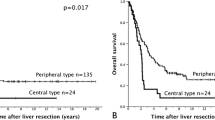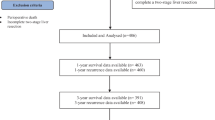Abstract. Hepatic resection remains the only potentially curative treatment for metastatic colorectal cancer. This retrospective review study was undertaken in an attempt to identify factors that influence patient survival following hepatic resection for metastatic colorectal cancer. From January 1978 to December 1993, a total of 301 patients underwent a total of 345 planned hepatic resections for metastatic colorectal cancer. Of those, 245 patients had one resection, 44 had two resections, and 12 had three resections. For all patients the overall median survival was 20.6 months, operative mortality was 1.1%, and overall morbidity was 17.2%. Average hospital stay was 9 days. Statistical analysis included univariate analysis using log rank comparisons, Kaplan-Meier survival curves, and multivariate analysis using Cox proportional hazards regression. The statistically significant factors that influenced survival were distribution of liver metastases, unilobar versus bilobar (
p = 0.0001), resected versus nonresected ( p < 0.0001), and tumor-free surgical margins versus positive margins ( p = 0.001). Surprisingly, the disease-free interval and the original stage of the primary tumor did not predict survival ( p = not significant). Other factors that had no influence on survival were type of resection, size and number of liver metastases, ABO blood group, and the number of perioperative blood transfusions. For those patients who underwent resection of unilobar metastases with tumor-free margins, the 5-year survival rate was 29% with a median survival of 35 months and eight survivors > 7 years. In addition, one patient with bilobar disease had survival > 7 years and five patients who had resection of hepatic metastases and extrahepatic cancer simultaneously had survival > 3 years. Our data support the concept that patients with unilobar metastatic disease who undergo surgical resection with tumor-free surgical margins can be afforded a significant opportunity at long-term survival with acceptable morbidity, mortality, and hospital stay. Also, certain patients with bilobar or extrahepatic disease (or both) who undergo complete resection can enjoy a long-term survival. In these subgroups of patients resection should be considered on an individual basis.
Similar content being viewed by others
Author information
Authors and Affiliations
Rights and permissions
About this article
Cite this article
Bakalakos, E., Kim, J., Young, D. et al. Determinants of Survival following Hepatic Resection for Metastatic Colorectal Cancer. World J. Surg. 22, 399–405 (1998). https://doi.org/10.1007/s002689900404
Issue Date:
DOI: https://doi.org/10.1007/s002689900404




